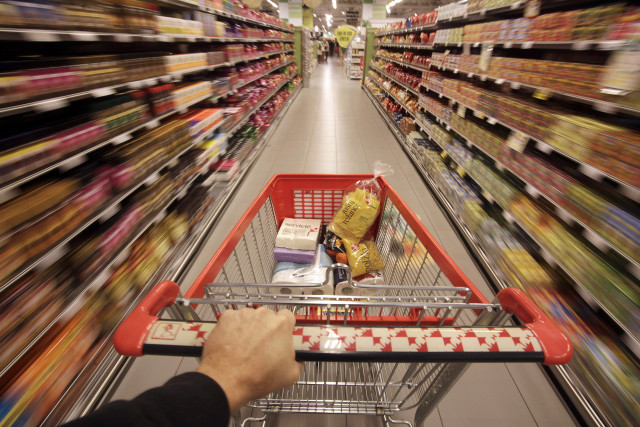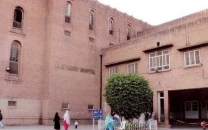Series of crackdowns bring prices of essentials down
Over Rs7.95 million penalties are imposed on price regulations violations

PHOTO: Reuters
Official statistics indicate that district administration had inspected prices at over 17,000 retail shops and registered FIRs against 824 retailers and traders over profiteering during November. Price control magistrates also slapped over Rs7.95 million penalties and arrested over 828 persons over various violations of price regulations during last month.
A market survey showed that the price of tomato which was hovering over Rs300 per kilogramme a couple of weeks ago had fallen to Rs180 to Rs200 a kilogramme. Onion which was hovering above Rs100 a kilogramme had been brought down to Rs80, potato Rs80, garlic Rs350 and ginger Rs400 a kilogramme. A similar trend is being witnessed in the prices of other seasonal vegetables.
Inflation rises 11.4% on hike in food, energy prices
Speaking to The Express Tribune, a citizen Muhammad Irfan said though a little respite is being observed in commodity prices most vegetables’ prices were still above average level. “Earlier, the government had given free hand to traders and greengrocers to fleece citizens. If the government has taken action earlier traders would not get the opportunity to jack up prices,” he added.
Greengrocers continued to blame that the government has a flawed system of price control and price fixation. They said the issue of price control could not be solved permanently until the government makes its auction system at the wholesale stage.
A greengrocer from Green Town said market committee officials are printing deflated rates in price list just to keep their seniors and the government happy that prices are at a reasonable level. In fact, there is a huge contrast in wholesale price and rates mentioned in the official price list. “We are getting seasonal commodities at higher rates but local administration is pushing greengrocers to reduce the vegetable rate at the retail level. The government has shifted all wholesale markets at outskirts of the city and transport cost has been multiplied following the increase in petroleum products prices. In these circumstances it is impossible for greengrocers to run their businesses successfully,” he underlined.
A spokesman for the Punjab Trade and Industries Department highlighted that price control magistrates are regularly conducting raids for the monitoring of prices of essential items in the whole of the province. The government has decided to show-zero tolerance against profiteering and artificial price hike.
In Pakistan, inflation drops slightly to 11% in Oct
The government has established Kissan platforms in 32 model bazaars across Punjab to rein in commodity prices and facilitate farmers. The government has provided free space to farmers in model bazaars for selling their produce directly to the consumer.
Kissan platforms have been set up in 12 model bazaars in Lahore division, one each in model bazaars of Bahawalpur and Sahiwal divisions, four each in Gujranwala and Faisalabad divisions and three each model bazaars have been set up in DG Khan and Sargodha divisions. Similarly, two Kissan platforms have been set up in Rawalpindi division and the same number of platforms has been set up in Multan division.
Published in The Express Tribune, December 3rd, 2019.



















COMMENTS
Comments are moderated and generally will be posted if they are on-topic and not abusive.
For more information, please see our Comments FAQ